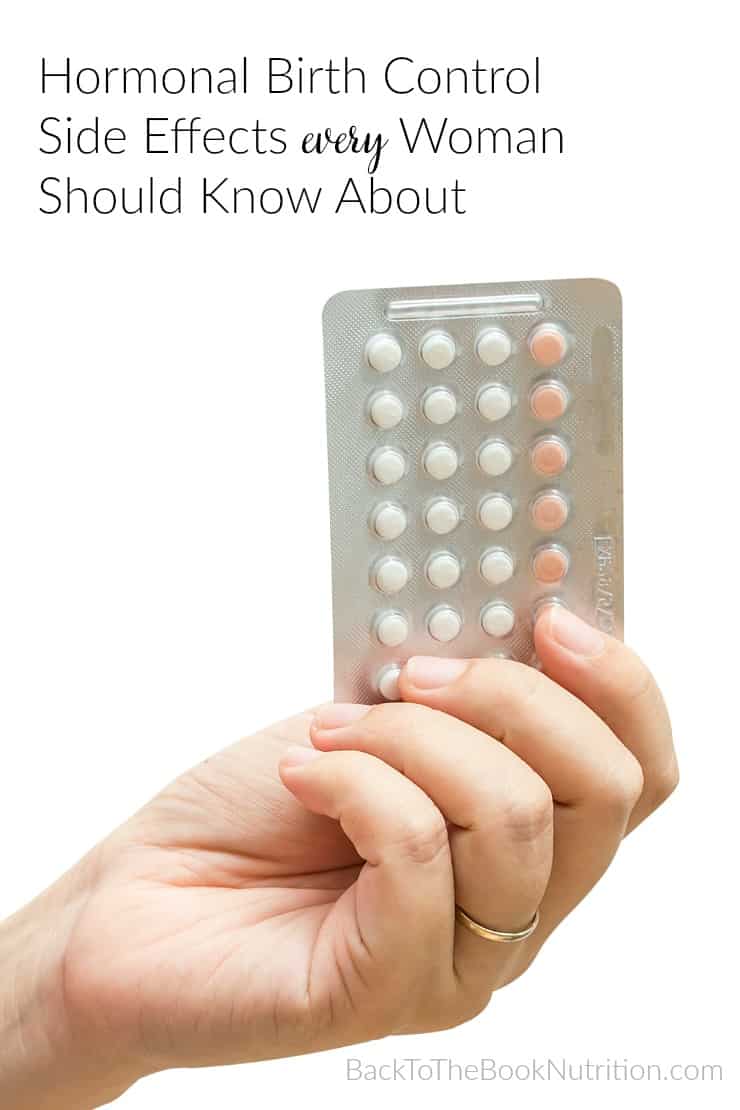Did you know that the pill and other hormonal birth control methods can have serious side effects like depression, suicide, blood clots, acne, infertility, nutrient deficiencies, and even cancer? Learn more and get natural alternatives in this must-read post for every woman!
Note from Dena: This post was co-written with Abbie Womack, Dietetic Intern, as part of a research partnership between Back To The Book Nutrition and post-graduate nutrition students from the University of Houston.
Birth control is one of the most commonly used medications worldwide with an estimated 100 million women taking the pill (9). But do you actually know how it works and what the short term and long term side effects are?
How hormonal birth control works to prevent pregnancy
Hormonal birth control contains synthetic forms of estrogen (“estradiol”) and/or progesterone (“progestin”). These are considerably different than the natural hormones we make as women but they do have hormonal effects, essentially raising circulating hormone levels to the degree that the body is “tricked” into believing it’s pregnant.
Thus, ovulation is prevented, eggs should not be released, and fertilization and implantation (pregnancy) cannot occur.
Other reasons women take hormonal birth control
Although hormonal birth control is mainly used to prevent pregnancy, many women use certain forms of hormonal birth control (i.e., the pill, birth control implants, and birth control shots) for other reasons, such as:
- Acne
- Heavy/painful periods
- Irregular periods
- PMS
- Managing symptoms of PCOS, endometriosis, uterine fibroids, and other hormone abnormalities
Birth control may be helpful for symptom management in some of these cases, but it is definitely not the only option and usually doesn’t address the root cause – in fact, it can sometimes make things worse (1). Many other approaches exist to treating these conditions that do not involve altering hormone cycles.
Top 6 Hormonal Birth Control Methods + Side Effects of Each
There are lots of different ways to receive hormonal birth control, each with its pros and cons. If you’re already using or considering using any of these methods of hormonal birth control, it’s important to carefully consider each of these side effects, some of which your doctor may not have discussed with you.
1. The Pill
This is the most common form of birth control, and may contain either a combination of estrogen and progestin (synthetic hormones) or progestin only. (1)
Combination pills work primarily by preventing ovulation (release of an egg), but they also have two additional methods of “back up” pregnancy prevention: they thicken the cervical mucous and thin the uterine lining. Most combination pills are taken three weeks out of the month, with a one-week placebo pill to allow for flushing of the uterine lining. Note that the “pill bleed” that occurs during the fourth week is not a real period, but rather a symptom of medication withdrawal. (2) Alternatively, some pills can be taken with no breaks so that pill bleeds don’t occur.
Progestin only pills (aka: “mini pills”) are far less effective at preventing ovulation (ovulation is prevented around 50% of the time in traditional progestin only pills, though newer pills claim higher rates). Therefore, they rely more heavily on thinning the uterine lining to prevent implantation of a fertilized egg.
So birth control pills work in three ways to prevent pregnancy:
- Preventing ovulation
- Thickening the cervical mucous, making it difficult for sperm to enter
- Thinning the uterine lining to prevent implantation should ovulation occur and a sperm reach the egg to fertilize it
Common Brand Names of Combination Pills: Alesse, Apri, Aranelle,Aviane, Enpresse, Estrostep, Lessina, Levlen, Levlite,Levora, Loestrin, Mircette, Natazia, Nordette, Lo/Orval, Ortho-Novum, Ortho Tri-Cyclen, Yasmin, andYaz
Common Brand Names of Progestin Only Pills: Camila, Errin, Heather, Jolivette, Micronor, Nor-Q.D., Norethindrone, Ovrette
Advantages of Taking the Pill:
- Easy
- Noninvasive
- Can stop whenever you want
- Combination pills may decrease risk for ovarian, endometrial, and thyroid cancer (7)
Side Effects of The Pill:
- Combination pills may increase risk for liver and breast cancer (7)
- Combination pills increase blood pressure and cholesterol, as well as increasing risk of blood clots, stroke, and heart attacks (7)
- Low libido
- Increased rates of depression and suicide, doubling the likelihood of needing antidepressants and significantly increasing suicide rates, especially among teens. (5,6,10)
- Headaches and nausea, especially during startup phase (3)
- Increased risk of gallstones
- Progestin only pills may cause bone loss
- Nutrient deficiencies such as antioxidants, B vitamins, and minerals like copper, zinc and selenium (2).
- Decreased thyroid function (7)
- Infertility/delayed fertility for up to two years after stopping birth control for some women (4)
- Early menopause (7)
- Pregnancy possible with missed doses
- Moral complaints about the potential for preventing implantation of a fertilized egg
2. Birth Control Implant
This is a rod about the size of a matchstick that is inserted in your upper arm. The implant releases progestin into the bloodstream, so it primarily acts by thinning the uterine lining to prevent implantation of a fertilized egg. , similar to the progestin only pill. Implants must be inserted and removed by a doctor.
Common Brand Names of Implants: Norplant, Jadelle (Norplant II), Implanon/Nexplanon
Advantages of Implants:
- No daily pills to remember
- Can last up to 5 years if not removed
- May decrease risk for ovarian, endometrial, and thyroid cancer (7)
Side Effects of Birth Control Implants:
- Acne
- Hair Loss
- Hirsutism (hair growth in the wrong places)
- Insulin resistance
- Weight gain
- Breast tenderness
- Erratic bleeding
- Low libido
- Decreased thyroid function (7)
- Bone loss
- Nutrient deficiencies such as antioxidants, B vitamins, and minerals like copper, zinc and selenium (2).
- Infertility/delayed fertility for up to two years after stopping birth control for some women (4)
- Early menopause (7)
- Moral complaints about the potential for preventing implantation of a fertilized egg
- Insertion/removal can be painful
3. Birth Control Injection
This is a shot that may contain a combination of estrogen and progestin (synthetic hormones) or progestin only. Combination shots are given monthly and progestin only shots are given every three months. These can be given by a doctor or, in some cases, self-administered by the individual.
Common Brand Names of Combination Birth Control Injections: Lunelle, Cyclofem, Mesigyna
Common Brand Names of Progestin Only Birth Control Injections: Depo-Provera, Noristerat
Advantages of Birth Control Injections:
- No daily pills to remember
- Three-month gap between injections for progestin only versions
- Progestin only injections will allow for some ovulation
Side Effects of Birth Control Injections:
- Combination shots may increase risk for liver and breast cancer (7)
- Combination shots may increase blood pressure and cholesterol, as well as increasing risk of blood clots, stroke, and heart attacks (7)
- Depression and anxiety
- Breast tenderness
- Low libido
- Headaches and nausea, especially during startup phase (3)
- Increased risk of gallstones
- Progestin only injections may cause bone loss
- Decreased thyroid function (7)
- Nutrient deficiencies such as antioxidants, B vitamins, and minerals like copper, zinc and selenium (2).
- Insulin resistance, though less than the pill or birth control injections
- Weight gain, though less than the pill or birth control injections
- Infertility/delayed fertility for up to two years after stopping birth control for some women (4)
- Early menopause (7)
- Moral complaints about the potential for preventing implantation of a fertilized egg
- Pregnancy if you are late getting your injection
4. Vaginal ring
This is a small, flexible ring worn inside the vagina that releases synthetic estrogen and progestin.
Common Brand Names of Vaginal Rings: Nuvaring
Advantages of Vaginal Rings:
- No daily pills to remember
- Can be worn at all times
- Option to remove to allow for bleeding or left in to completely skip bleeding (remember, this isn’t a true period but a withdrawal from the medication)
- Can be applied and removed by the individual
Side Effects of Vaginal Rings:
- Blood clots and possibly blood pressure, cholesterol, stroke, and heart attack (7)
- Depression and anxiety, though less than the pill or birth control injections
- Acne, though less than the pill or birth control injections
- Breast Tenderness
- Hair Loss, though less than the pill or birth control injections
- Hirsutism (hair growth in the wrong places), though less than the pill or birth control injections
- Low libido
- Insulin resistance, though less than the pill or birth control injections
- Weight gain, though less than the pill or birth control injections
- Nutrient deficiencies such as antioxidants, B vitamins, and minerals like copper, zinc and selenium (2).
- Will become inactive if not changed monthly
5. Transdermal patch
Patches are worn on the stomach, upper arm, buttocks, or back and release estrogen and progestin. They can be placed and removed by the individual and are usually changed out weekly.
Common Brand Names of Transdermal Patches: Xulane, Ortho Evra
Advantages of Transdermal Patches:
- No daily pills to remember
- Noninvasive
- Can be applied and changed out by the individual
- Option to allow for bleeding or skip bleeding altogether (remember, this isn’t a true period but a withdrawal from the medication)
Side Effects of Transdermal Patches:
- Depression and anxiety, though less than the pill or birth control injections
- Acne, though less than the pill or birth control injections
- Hair Loss, though less than the pill or birth control injections
- Hirsutism (hair growth in the wrong places), though less than the pill or birth control injections
- Low libido
- Breast tenderness
- Decreased thyroid function (7)
- Erratic bleeding
- Insulin resistance, though less than the pill or birth control injections
- Weight gain, though less than the pill or birth control injections
- Nutrient deficiencies such as antioxidants, B vitamins, and minerals like copper, zinc and selenium (2).
- May not be effective if not changed on time
- Possible skin reactions at patch sites
6. Hormonal IUD (intra-uterine device)
This is a T-shaped device the size of a quarter that is inserted by a doctor in the uterus. It releases progestin only into the uterus, and it prevents pregnancy by thinning the lining of the uterus to prevent implantation of a fertilized egg. For the most part, someone with an IUD will still ovulate. (11) Some people find this form of birth control to be morally unacceptable due to the fact that the intervention happens after fertilization.
Note: Copper IUDs don’t use hormones, so we won’t cover them in this post.
Common Brand Names of IUDs: Mirena, Skyla, Kyleena, Liletta
Advantages of Hormonal IUDs:
- No daily pills to remember
- Can last up to 10 years if not removed
- Allows for ovulation and menstrual flow, but at a reduced rate
- Side effects are generally milder than pills, patches, and injections
Side Effects of Hormonal IUDs:
- Some can cause heavier bleeding for the first year
- Acne
- Hair loss
- Hirsutism (hair growing in the wrong places)
- Depression and anxiety
- Headaches
- Breast pain
- Yeast infections due to changes it causes to the vaginal microbiome
- Decreased thyroid function (7)
- Insulin resistance
- Weight gain
- Bone loss
- Rare risk of perforation of uterus during insertion
- Must be removed by a doctor
- Moral complaints about the potential for preventing implantation of a fertilized egg
Reconsidering hormonal birth control?
If all of this makes you think twice about taking hormonal birth control, good news – There are other options!
Alternatives for Preventing Pregnancy:
- The Fertility awareness method (FAM) can be just as effective – or even more effective – than the pill. This method involves tracking your monthly cycle and avoiding sexual activity or using protection during your most fertile times (5).
- Copper IUDs like ParaGard are also quite effective, minimally invasive, and do not interfere with hormone production. They are inserted by a doctor and can last for up to 10 years. The copper portion of the IUD is toxic to both sperm and eggs so fertilization is prevented.
Alternatives for Balancing Hormones:
If you struggle with acne, heavy/painful periods, irregular periods, or PMS, it is important to address the root causes for your hormone imbalance rather than just covering up the symptoms. Here are some first steps:
- Balance your hormones naturally with food, supplements, and lifestyle
- Manage your stress and address any HPA axis dysfunction
- Fix your gut, since gut health is critical for hormone health and overall health.
- Balance your blood sugar(8)
If you’re looking for a personalized plan to come off of birth control and balance your hormones naturally, I’d love to help!
Learn more about my Holistic Nutrition Coaching services!
Check out these other posts about healthy hormones!
17 Ways to Balance Your Hormones Naturally
How to Know if your Period is Normal (7 signs it is + 12 signs it isn’t)
Why and How to Track your Basal Body Temperature (BBT)
About the Co-Author
Abbie earned her Bachelors and Masters Degrees in Nutritional Sciences from Oklahoma State University, and is currently completing her dietetic internship with the University of Houston before going on to work in the field of eating disorders. Abbie is newly married and enjoys swimming and eating ice cream!
Disclaimer: Information on this site is intended only for informational purposes and is not a substitute for medical advice. Always consult with a trusted healthcare provider before implementing significant dietary change. Read additional disclaimer info here.
References:
- Brighten, Jolene. “Birth Control – What Doctors Don’t Say About Birth Control Effects on Body.” Jolene Brighten, 12 Apr. 2018, http://drbrighten.com/birth-control-what-your-doctor-didnt-tell-you/.
- Briden, Laura. “Pill Bleeds Are Not Periods.” Hormones Matter, 18 Oct. 2017, hormonesmatter.com/pill-bleeds-periods/.
- Myers, Amy. “What You Need to Know Before Taking Birth Control Pills.” Amy Myers MD, 20 Feb. 2018, amymyersmd.com/2015/12/birth-control-pills/.
- Barnhart, K T, and C A Schreiber. “Return to Fertility Following Discontinuation of Oral Contraceptives.” Fertility and Sterility., U.S. National Library of Medicine, Mar. 2009, https://www.ncbi.nlm.nih.gov/pubmed/19268187
- Toffoletto, S. “Emotional and Cognitive Functional Imaging of Estrogen and Progesterone Effects in the Female Human Brain: a Systematic Review.” , U.S. National Library of Medicine, Dec. 2014, www.ncbi.nlm.nih.gov/pubmed/25222701.
- Chris Kresser. “The Little-Known Link between Birth Control Pills and Depression.” Chris Kresser, Chriskresser.com, 20 Dec. 2016, chriskresser.com/the-little-known-link-between-birth-control-pills-and-depression/.
- Gottfried, Sara. “Risks of Birth Control Pill: 8 Reasons To Quit and How to Stay Healthier If You Don’t.” Sara Gottfried MD, 2017, saragottfriedmd.com/the-birth-control-pill-7-reasons-why-you-may-want-to-stop-and-how-to-stay-healthy-if-you-dont/
- Chris Kresser. “How to Fix Your Period without Birth Control.” Chris Kresser.com, 15 Dec. 2016, http://chriskresser.com/how-to-fix-your-period-without-birth-control/com/how-to-fix-your-period-without-birth-control/.
- Birth Control Pill Could Cause Long-Term Problems With Testosterone. Published by Medical News Today: https://www.medicalnewstoday.com/releases/35663.php
- Skovlund, C.W., et al., 2017. Association of Hormonal Contraception with Suicide Attempts and Suicide. Published online by the American Journal of Psychiatry: https://ajp.psychiatryonline.org/doi/10.1176/appi.ajp.2017.17060616
- Briden, Lara. “Pros and cons of the Hormonal IUD (Mirena): a natural health perspective. https://www.larabriden.com/pros-cons-mirena-iud-natural-health/








Thanks for sharing your idea, I read your blog and it is a fantastic idea about health and birth control.
This is such an informative post and I found it at just the right time! I’m planning on talking to my doctor about birth control 🙂
I’m so glad it came at a helpful time for you, Kasia!
This is very informational! I am so glad that I don’t have to take birth control any more. But for those who do, this is such useful info!
Yes, I wish I had this information when I was younger. It can be a life changer for young women.
This is really good information and that everything is grandma needs to know. Actually every girl considering having relations should really know this. Too often we only know that we want to prevent pregnancy and not enough taboo the side effects.
Lavern, you are right. There are some significant risks and long term effects that every young woman deserves to know before she decides to take birth control.
Such wonderful advice especially to those people who take birth controls I would share this to married friends 🙂
Its something that every woman deserves to know about. I wish I would have had this information given to me when I was younger.
There is so much good info here. It should be a required reading for all. When on birth control, one rarely pays attention to side effects anf they are so important to understand. I’ve used an IUD for 22 years and I’ve enjoyed it for the most part. No problems and very essy. Thanks for sharing the updated info.
Thanks for sharing your personal experience Nichelle! You are right, all women deserve to understand the risks and long term effects of birth control pills.
I’ve been working at a Gyn office for over 10 years now so I’ve seen all of this. Women using each of these methods, women with the side effects, and women who have no issues with any of them. But, I am so happy I had a tubal with my second delivery (emergency cesarean) so I don’t have to worry about any of these. In between kids, though, we were using FAM with great success.
Thanks for sharing your personal experiences with us Stephanie.
Birth controls have always failed for me, which is insanity. Two out of my three children are actually birth control babies. I always felt so bad on the one I took too. I wish I would have had this.
Wow, Becca! I’m like you – I wish I had this information years ago before ever starting the pill. Know better, do better, right?
Thanks for sharing this. I take the pill because of horrible periods. I always heard the pill could help prevent certain types of cancer. Going to have to look more into this.
Hi Dia, Thanks for your comment. Just to clarify – it’s true that the pill is associated with lower risks of some cancers (ovarian, endometrial, and thyroid cancers), but it’s also associated with increased risk for others (liver and breast cancer). Definitely look into it so you can make an informed decision!
Hhhaaaaaaa….this is very priceless information, Dena. Thank you for sharing. I’ve LOVED IT!!!!
Much love.
You’re very welcome. 🙂